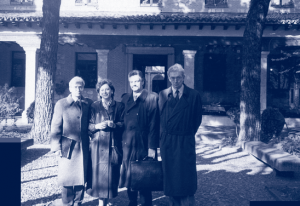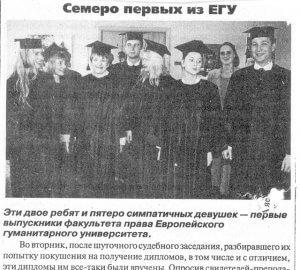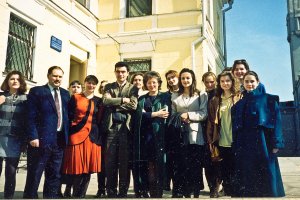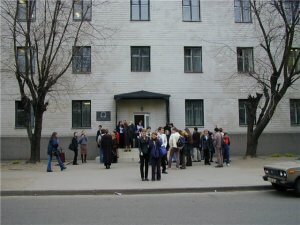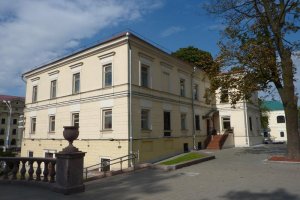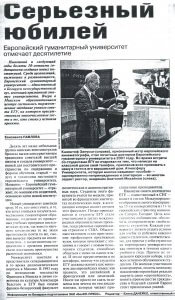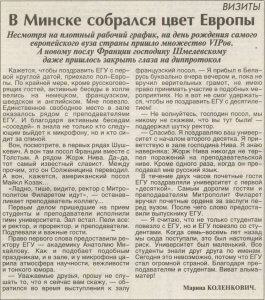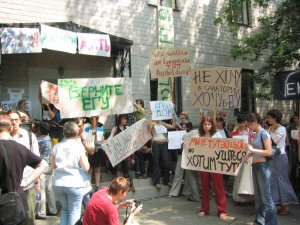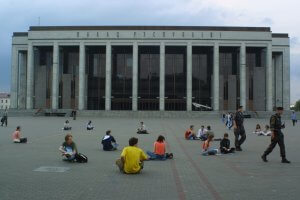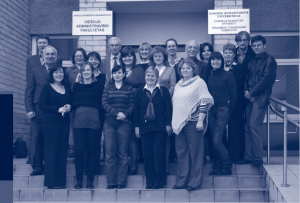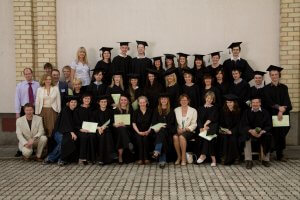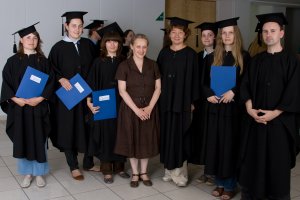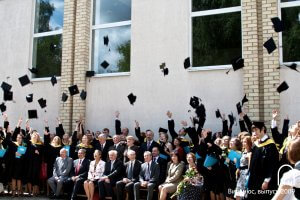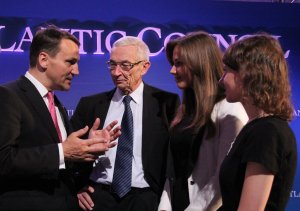1992-2004: Minsk, Belarus
In late 1991, a meeting between Prof. Anatoli Mikhailov, Head of the Belarusian Orthodox Church Metropolitan Philaret, and Prof. Vladimir Dounaev took place, where the idea of establishing the European Humanities University first emerged. The final structure of the University was developed in the process of consultations at the United Nations Secretariat in Vienna, namely with Irene Melup, a world-renowned defender of victims’ rights.
In 1992 the Belarusian Ministry of Education, Ministry of Culture, National Academy of Sciences, the Minsk Municipal Executive Committee, the International Foundation “Humanities” joined the project as its part-owners. Several leaders of the European states, as well as European and US Ambassadors to Belarus welcomed the idea of the foundation of the University.
EHU was the first university in Belarus to follow the example of Western colleges and universities. Its activities were focused on a fundamental study of the humanities and social sciences. EHU founders meant to establish an independent university that would support the revival of the values of European civilization during the period of transition from totalitarianism to democracy. The mission of the University was to educate the new generation of young professionals capable of leading Belarus on its way towards civil society.
- V. Dunaev, A. Sokolova, S. Pankovsky and A. Mikhailov (Madrid, University of Alkala de Enares)
- The conference on human rights, 1998-1999
- The first EHU MA graduates in Minsk
The University Board appointed Prof. Anatoli Mikhailov the first Rector of EHU.
The first international program was established in 1993. Through the initiative of the Embassy of France, the French-Belarusian Department of Political and Administrative Sciences was founded on the basis of the French model of the Institutes of Political Sciences.
In 1993, EHU started cooperation with the U.S. Embassy in Minsk, which at that time was headed by Ambassador David Swartz. Having retired from his position, Ambassador David Swartz established the U.S.-based European Humanities University Foundation. This cooperation resulted in a number of important academic programs with American universities in the fields of U.S. Studies and Public Administration.
In 1994, EHU obtained its first grant from the Open Society Institute to renovate the administrative building at 24 Frantsiska Skaryny Ave. in Minsk. Since 1994, EHU has been engaged in fruitful long-term cooperation with the Open Society Institute, and in particular with the Higher Education Support Program (HESP) in Budapest.
The project of reforming legal education in Belarus, implemented on the basis of the Department of Law, gained a reputation as one of the most significant TEMPUS projects. The contacts, which EHU established with universities in France and Spain during this project, made it possible to continue further academic cooperation.
- Graduates of the Law Department, A. Romanovich, L. Pavlova, A. Sokolova, A. Mikhailov, Director of the National Center for Legislative Activities I. Andreev, Minister of Justice V. Golovanov, 2000
- Law Department Students (TEMPUS), N. Kovalev, visiting Professor, University of Bordeaux, A. Sokolova, 1997-1998
This project was the first step of the EHU in cooperation with the European Commission and other European organizations in the area of higher education. This resulted in the development of new study programs in European Studies, as well as a Center for European and Transatlantic Studies supported by the European Union and the Organization for Security and Cooperation in Europe.
In 1998, the Institute for German Studies was established at EHU with the support of the Federal Government of Germany and German foundations.
In the same year, EHU Center for Gender studies was founded with the support by the John D. and Catherine T. MacArthur Foundation.
There were 8 departments providing diploma-level training at the European Humanities University. Thirteen major programs were in Philosophy, Cultural Studies, Theology, Political Science, Psychology, International Law, World Economy, Economics, History and Theory of Art, International Cultural Tourism, Computer Science (Web-Design and Computer Graphics). Minor programs were offered in American Studies, European Studies, and International Economic Law.
Since 1997, University has been offering Ph.D. programs in Philosophy and Law. In 2000, EHU established postgraduate programs in Psychology, Cultural Studies, and Economics.
- EHU Campus in Minsk, 3A P. Brouki Str.
- EHU Administrative Office in Minsk, 24 Frantsiska Skaryny Ave.
EHU library possessed a unique collection of literature in foreign languages in the field of humanities and social sciences. A selection of up-to-date specialized literature in French and German was unprecedented in Belarus.
The University provided a unique creative environment for research activity. It hosted significant cultural events, research conferences, and seminars of international importance.
In 2002, the European Humanities University celebrated its 10th anniversary. On the eve of this event, EHU became one of the first members of the Association of European Universities Campus Europae.
In 2004, the Belarusian authorities started to undermine the academic freedom and autonomy of the University. As a result, EHU was forced to cease its activities in Belarus. On July 27, 2004, the Ministry of Education of the Republic of Belarus revoked EHU’s license for the provision of educational services claiming as if the campus was unsuitable for classes. The actions of the authorities provoked mass protests, about two hundred students and faculty defended their right to study and work in EHU.
- Protest by EHU campus, July 28, 2004
- Protest by EHU campus, July 28, 2004
- Flashmob in support of EHU, August 2, 2004
- Flashmob in support of EHU, August 2, 2004
2005 – now: Vilnius, Lithuania
The fight for academic freedom was fruitful. Thanks to political, administrative, and financial support from the European Union, the Nordic Council of Ministers, the Government of Lithuania and other European countries, the United States, NGOs and international foundations like MacArthur Foundation, Carnegie Corporation of New York, and others, EHU resumed its operations in Vilnius, Lithuania. In 2006 EHU was granted the official status of a Lithuanian University.
After relocation to Lithuania, EHU found its new home in the premises of Mykolas Romeris University in Vilnius, where EHU campus was located up until 2018.
- EHU students and faculty, November 7, 2007
- EHU Campus, 2005-2018
- EHU staff in Vilnius, 2007
Two years later, after EHU’s relocation to Lithuania, the first master’s degree students celebrated their graduation in Vilnius. In 2009, the first EHU undergraduate students completed their first cycle of studies in Vilnius.
- First MA graduation in Vilnius, June 7, 2007
- First MA graduation in Vilnius, “Visual Studies” program, July 28, 2007
- President of Lithuania Valdas Adamkus during the first BA graduation in Vilnius, 2009
- First EHU BA graduation in Vilnius, 2009
Today, EHU offers high-residence and low-residence undergraduate, graduate and postgraduate degree programs in fields of humanities, social sciences, and arts. EHU is a student-centred university, which promotes civil society development, European values, and superior quality of studies and research. This allows to maximize the creative and academic potential of students, develop their critical thinking, agility and life-long learning skills.
Being a member of the Bologna process EHU organizes its academic processes according to the standards of the European Higher Education Area. Upon successful completion of degree studies, EHU graduates receive European Union-recognized diplomas.
In summer 2012, EHU celebrated its 20th anniversary in Vilnius Town Hall. More than 200 current and former faculty, alumni, students, staff, supporters, and friends of gathered to celebrate this significant milestone in EHU’s history.
On June 14, 2013, EHU was awarded an Atlantic Council Freedom Award for unwavering commitment to democracy in Belarus by providing Belarusian students with a free and democratic environment to pursue their education.
- Foreign Minister of Poland Radosław Sikorski, EHU Rector and students during Atlantic Council Freedom Awards, June 14, 2013
On November 17, 2017, EHU’s 25th Anniversary ceremony took place in Vilnius at the new EHU Campus in the premises of the former Augustinian monastery. Doctor Honoris Causa degrees were bestowed to two distinguished personalities: Chairman of the Konrad Adenauer Foundation Dr. Hans-Gert Pöttering and President of the American Academy of Arts and Sciences Dr. Jonathan Fanton. The faculty and staff members, who served at EHU for 20 and 15 years, were bestowed special diplomas to recognize their contributions to the University.
- Ambassador Andrea Wiktorin, Prof. Anatoli Mikhailov, Prof. Christoph Ehmann, Dr. Hans-Gert Poettering, Prof. Daniel Tarschys, Ambassador Deividas Matulionis, Dr. Wolfgang Sender, Prof. Ludger Kuehnhardt
- Speaker of the Riksdag of Sweden Urban Alin
- EHU faculty and graduates
Symbolically, in the year of the 25th anniversary, EHU began its operations in the new campus in the former Augustinian monastery in the Vilnius Old Town. On May 3, 2018, the new premises were opened by EHU Rector Prof. Sergei Ignatov, EHU President Prof. Anatoli Mikhailov, and Vice Minister for Foreign Affairs Darius Skusevičius. The present EHU campus was built in 18 century and preserved the original frescoes and pavement. It was transferred to EHU following the decision of the 17th Government of Lithuania.
- New EHU Campus opening, May 3, 2018
- Vice Minister Darius Skusievičius, President Prof. Anatoli Mikhailov, Rector Prof. Sergei Ignatov
- EHU students
